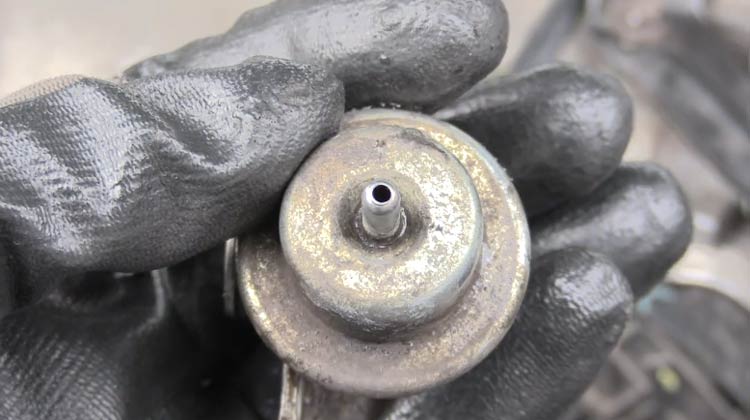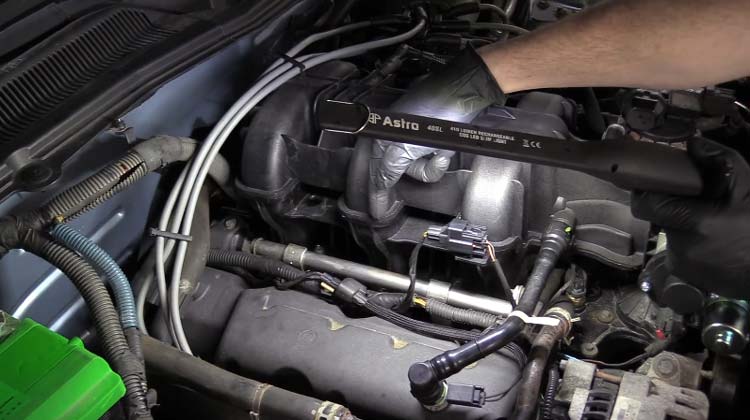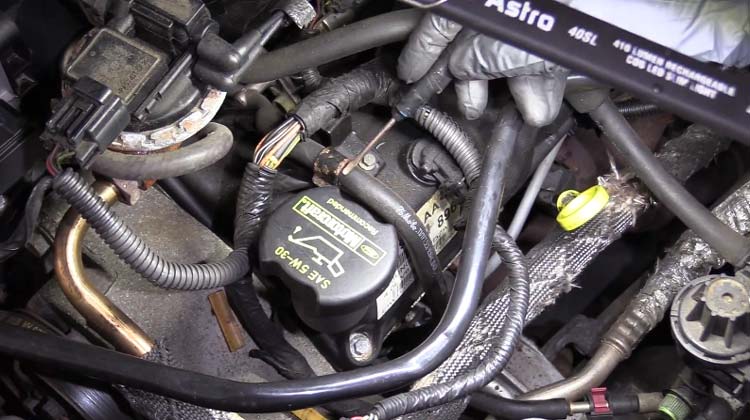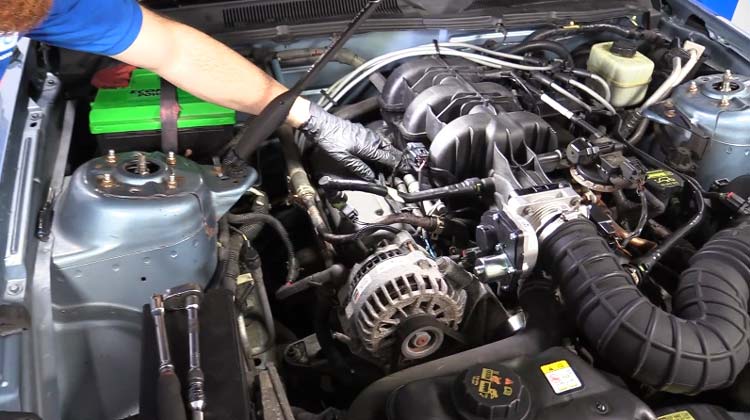If you are experiencing problems with your car’s gas, it can be very frustrating. Not only is it a hassle to take your car in for repairs, but it can also be expensive. In this guide, I will discuss the most common causes of bad gas in cars and the symptoms associated with them. I will also provide a solution for each problem so that you can get back on the road as quickly as possible!
Causes of Bad Gas in Car: Detailed Discussion

There are several different things that can cause bad gas in your car. The most common causes are listed below, along with their associated symptoms.
1. Water in the Gas Tank:
One of the most common causes of bad gas is water contamination. When water gets into the gas tank, it can mix with the gasoline and cause all sorts of problems. The symptoms of this problem include a loss of power, sputtering, and stalling. If you think you may have water in your gas tank, it is important to have it drained and flushed as soon as possible.
2. Clogged Fuel Filter:
Another common cause of bad gas is a clogged fuel filter. The fuel filter is responsible for trapping dirt and debris that may be in the gas before it gets to the engine. Over time, the fuel filter can become clogged and cause the engine to run less efficiently. The symptoms of a clogged fuel filter include a loss of power, decreased fuel economy, and hard starting. If you think your fuel filter may be clogged, it is important to have it replaced as soon as possible.
3. Bad Spark Plugs:
Spark plugs are another common cause of bad gas. Spark plugs are responsible for igniting the fuel in the engine. Over time, spark plugs can become fouled or damaged and cause the engine to misfire. The symptoms of bad spark plugs include a loss of power, decreased fuel economy, and hard starting. If you think your spark plugs may be bad, it is important to have them replaced as soon as possible.
4. Bad Oxygen Sensor:
The oxygen sensor is responsible for monitoring the amount of oxygen in the exhaust. If the oxygen sensor is not working properly, it can cause the engine to run lean or rich. The symptoms of a bad oxygen sensor include a loss of power, decreased fuel economy, and hard starting. If you think your oxygen sensor may be bad, it is important to have it replaced as soon as possible.
5. Leaky Injectors:
Leaky injectors are another common cause of bad gas. Fuel injectors are responsible for delivering the fuel to the engine. Over time, fuel injectors can become worn and start to leak. The symptoms of leaking injectors include a loss of power, decreased fuel economy, and hard starting. If you think your fuel injectors may be leaking, it is important to have them replaced as soon as possible.
Bad gas can be caused by a number of different problems. If you are experiencing any of the symptoms listed above, it is important to have your car checked out by a mechanic as soon as possible. With proper diagnosis and repair, you can get back on the road in no time!
Symptoms of Bad Gas in Car:

The symptoms of bad gas in your car can vary depending on the cause. However, there are some common symptoms that are associated with most causes of bad gas.
1. Acceleration Issues:
If your car doesn’t respond immediately upon acceleration, there could be an issue. This is especially important to note because if it’s caused by bad gas, you don’t want to keep driving and doing damage to the engine. The faster you drive, the worse off you’ll be if bad gas is the problem. In fact, it’s possible your car will refuse to accelerate when driving in less-than-optimal conditions.
Another possibility is that you’re having issues with your speed, either from one direction or the other. For example, you might be noticing that the RPMs increase even when you have your foot off of the accelerator pedal. All of these erratic changes are likely indicative of a fuel issue – whether it’s bad gas or failure in a key component.
2. Engine Stalling:
If your car is stalling and you suspect the problem might be with the fuel, consider its quality. If there is bad fuel in the system, it will prevent proper combustion from occurring.
A car’s engine needs the perfect mixture of high-quality fuel and air to function properly; without it, the engine becomes overworked and can shut down.
3. Engine Doesn’t Start:
In the unfortunate event that your engine won’t start, this can happen after it has stalled or when you are first trying to start it.
If the gas has been mixed with water or any other contaminants, the engine may not be able to start. However, car engines failing to start can be caused by a variety of issues. That’s why you need to consider all of the symptoms together to diagnose the problem.
4. Bad Smell From Exhaust:
When your car’s fuel system isn’t operating correctly, it can cause a bad smell to come from the exhaust. If you notice this problem, take your car to a mechanic as soon as possible so they can check for any leaks or other issues.
5. Faulty Fuel Filter:
The fuel system contains a filter that protects the engine from debris, contaminants, and dirt. All gas tanks have some sediment on the bottom, and if any of this were to make it to the motor, it would cause severe damage. If you have to change your fuel filter more often than usual, it could be because of bad fuel. That’s why it’s important to monitor the filter and change it regularly.
Remove Bad Gas from Your Car:

Bad gas can cause a lot of problems for your car, but there are some things you can do to try and remove it.
1. Use a Fuel Additive:
There are a number of fuel additives on the market that can help to remove water and other contaminants from your gas tank. Be sure to read the instructions carefully before adding any kind of additive to your tank.
2. Drain the Tank:
If you have bad gas in your car, one way to get rid of it is to drain the entire tank. This obviously isn’t the most convenient solution, but it will get rid of all of the bad gas in your car.
3. Fill the Tank with Fresh Gas:
If you can’t afford to drain your entire tank, you can try and dilute the bad gas by filling up with fresh gas. This method isn’t foolproof, but it might help to get rid of some of the bad gas in your car.
Bad gas can wreak havoc on your car’s engine, so it’s important to be aware of the symptoms and take action if you suspect there might be a problem. By following these tips, you can help to remove bad gas from your car and get back on the road in no time!
4. Try Use Dry Gasoline:
The simplest solution would be to use dry gasoline, but that’s not always foolproof. If there is only a small amount of water or condensation in the tank, it might do the trick and get your car started again.
This alcohol-based additive will treat your tank and get rid of the contaminants. Just follow the directions on the label and you’ll be good to go!
5. Siphon Out Gas:
If the dry gas doesn’t help, you will have to drain your tank. There are three ways to do so, with siphoning being the simplest method.
Disposing of bad gas is crucial, and you can do so by emptying the tank with a siphoning tube. But, be sure that you understand how to properly use the tube before attempting to empty the tank. The container used to hold the bad gas must also be qualified, or else disposed of correctly.
Avoid Bad Gas problems in Cars:

There are many ways to avoid bad gas problems in your car. The best way to avoid these problems is to be proactive and take steps to protect your car’s fuel system.
1. Use High-Quality Gas:
One of the best ways to avoid bad gas problems is to use high-quality gasoline. This type of gasoline is less likely to contain contaminants that can damage your car. So, it is best to use a higher-octane fuel whenever possible.
2. Store Gas Properly:
Another way to avoid bad gas problems is to store gasoline properly. Gasoline should be stored in a cool, dry place away from direct sunlight. So, it’s best to keep gas cans in the garage or shed.
3. Use a Fuel Additive:
Using a fuel additive is another great way to avoid bad gas problems. Fuel additives can help to remove water and other contaminants from your fuel system. Always be sure to read the instructions carefully before adding any kind of additive to your tank.
4. Monitor Your Fuel Filter:
Monitoring your fuel filter is another good way to avoid bad gas problems. If you notice that your filter needs to be changed more often than usual, it could be a sign that there are contaminants in your fuel.
5. Get Your Car Serviced Regularly:
Getting your car serviced regularly is the best way to avoid bad gas problems. A qualified mechanic will be able to spot any potential problems with your car’s fuel system and take steps to fix them.
6. Keep Your Car’s Fuel System Clean:
Another way to avoid bad gas problems is to keep your car’s fuel system clean. This can be done by regularly changing your car’s fuel filter. By keeping the fuel system clean, you can help to prevent contaminants from entering the engine and causing damage.
Bad gas can cause a lot of problems for your car, but there are some things you can do to avoid these problems. By following these tips, you can help to keep your car’s fuel system clean and free of contaminants.
Watch the video below, it may help you better understanding:
FAQs:
1. Does bad gas damage your car?
Bad gas can damage your car’s engine and fuel system. Contaminants in the gas can clog your fuel filter and cause your engine to run less efficiently. In extreme cases, bad gas can even damage your car’s catalytic converter.
2. How do you remove bad gas from your car?
The best way to remove bad gas from your car is to use a fuel additive. Fuel additives can help to remove water and other contaminants from your fuel system. Always be sure to read the instructions carefully before adding any kind of additive to your tank.
3. How often should you change your car’s fuel filter?
Most car manufacturers recommend that you change your car’s fuel filter every 15,000 miles or so. However, if you notice that your filter needs to be changed more often than usual, it could be a sign that there are contaminants in your fuel.
4. How do you know if you have bad gas in your car?
There are several symptoms that can indicate that you have bad gas in your car. These symptoms include a decrease in fuel efficiency, engine misfires, and stalling. If you notice any of these symptoms, it’s best to take your car to a mechanic for diagnosis and repair.
5. Can you drive with bad gas?
It’s not advisable to drive with bad gas in your car. Bad gas can damage your car’s engine and fuel system. So, it’s best to take your car to a mechanic for diagnosis and repair if you suspect that you have bad gas in your car.
Conclusion:
Bad gas can cause a lot of problems for your car. But there are some things you can do to avoid these problems. By using high-quality gasoline and storing it properly, you can help to prevent bad gas from damaging your car. And by using a fuel additive or monitoring your fuel filter, you can also help to keep your car’s fuel system clean. If you notice any symptoms of bad gas in your car, it’s best to take your car to a mechanic for diagnosis and repair.
I hope you found this guide helpful. If you have any further questions about Causes of Bad Gas in Car: Common Symptoms & Solution, feel free to reach out to me. I will be happy to help you.
